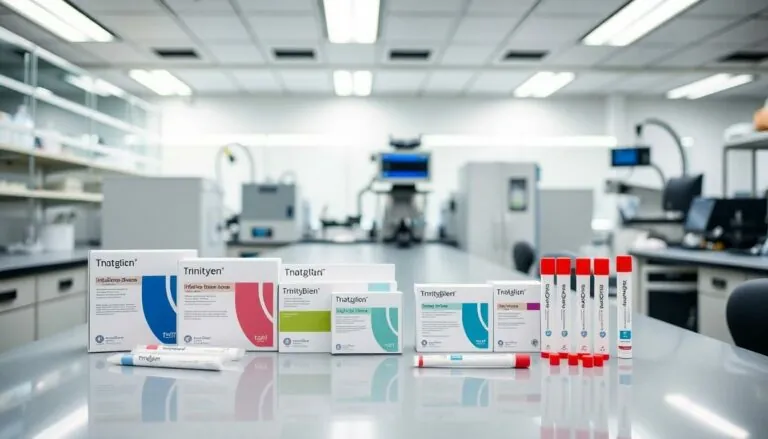Table of Contents
ToggleIn a world where science fiction is becoming reality, advanced biotech stands at the forefront of innovation. Imagine a future where diseases are tackled before they even start and food is grown in ways that defy nature. This isn’t just a pipe dream; it’s happening right now, and it’s more exciting than a cat meme going viral!
Overview of Advanced Biotech
Advanced biotechnology encompasses various cutting-edge techniques that manipulate biological systems and organisms. Genetic engineering and synthetic biology stand as significant components, enabling the modification of genes to create desired traits. This technology finds applications in healthcare, agriculture, and environmental management.
In healthcare, advanced biotech innovations lead to personalized medicine, allowing treatments tailored to an individual’s genetic profile. Targeted therapies and gene therapies exemplify this approach, significantly improving patient outcomes. Moreover, biotechnology contributes to vaccine development. The rapid response to emerging diseases showcases how biotech can combat health crises effectively.
Agricultural applications utilize biotechnology to enhance crop yield and resistance to pests and diseases. Genetically modified organisms, or GMOs, represent an essential tool in achieving food security. Techniques such as CRISPR gene editing refine these processes, making them more precise and efficient.
Environmental solutions also benefit from advanced biotechnology. Bioremediation employs microorganisms to clean up hazardous waste, demonstrating the potential of using nature to solve human problems. These advancements reduce reliance on harmful chemicals in pollution management.
The integration of artificial intelligence in biotech enhances research and development. AI-driven data analysis accelerates the discovery of new drugs and treatments significantly.
Regulatory frameworks evolve alongside these advancements, ensuring safety and efficacy in biotech products. Organizations monitor the progress of biotech innovations critically, balancing scientific advancement with ethical considerations.
Together, these components depict a transformative landscape shaped by advanced biotechnology, influencing diverse sectors and enhancing the quality of life globally.
Key Innovations in Advanced Biotech
Advanced biotech continues to evolve rapidly, introducing groundbreaking innovations across various sectors. These advancements drive significant improvements in healthcare, agriculture, and environmental management.
Gene Editing Technologies
CRISPR technology stands out as a major player in gene editing. This tool allows precise alterations in the DNA of organisms, enabling scientists to target specific genes with remarkable accuracy. Scientists utilize CRISPR for applications, such as creating disease-resistant crops and correcting genetic disorders in humans. Other gene editing tools, like TALENs and ZFNs, also contribute to breakthroughs but are less widely adopted than CRISPR. Data from recent studies shows that CRISPR has enhanced research efficiency by conducting experiments at unprecedented speeds. This acceleration profoundly impacts agricultural biotech, improving food security by developing crops with improved traits.
Synthetic Biology Advances
Synthetic biology has transformed the landscape of biotechnology by enabling the design and construction of new biological parts and systems. Researchers create customized organisms that produce essential compounds, including biofuels and pharmaceuticals. These engineered microbes may also participate in synthesizing complex molecules, which traditional methods struggle to create. Moreover, advancements in automation and computational modeling streamline the design process, increasing the efficiency of new biosynthetic pathways. As a result, companies develop sustainable practices that reduce environmental impact while meeting global demands for renewable resources. The potential applications span diverse fields, marking a significant leap forward in biotech’s role in addressing some of the world’s most pressing challenges.
Applications of Advanced Biotech
Advanced biotechnology plays a crucial role across various sectors, particularly in agriculture and healthcare. Its applications enhance productivity and drive innovations that address society’s most pressing challenges.
Agriculture and Food Production
Biotechnology significantly improves agricultural practices. Genetically engineered crops withstand pests and environmental stresses, boosting yields. CRISPR technology introduces precise genetic modifications, allowing for disease-resistant varieties that reduce pesticide use. Furthermore, advanced biotech solutions promote sustainable farming methods that minimize resource consumption while maximizing output. Farmers now adopt these innovations to ensure food security in response to a growing global population. These practices contribute to healthier ecosystems while meeting the demand for high-quality food products.
Healthcare and Pharmaceuticals
Healthcare experiences a revolution driven by advanced biotechnology. Personalized medicine leverages genetic information to tailor treatments for individuals, improving effectiveness and reducing side effects. Targeted therapies deliver precise action against specific diseases, particularly cancer. Innovations in vaccine development improve response rates and protection against emerging pathogens. Biotechnology also facilitates faster drug discovery through methodologies that streamline research processes. Moreover, advances in gene therapy aim to correct genetic disorders at the source, offering hope for previously untreatable conditions. These applications showcase biotechnology’s potential to enhance patient care and outcomes effectively.
Ethical Considerations in Advanced Biotech
Advanced biotechnology raises significant ethical considerations that impact society. Researchers, policymakers, and the public must address these challenges as innovations accelerate. Genetic editing technologies, like CRISPR, present promises and dilemmas. As they enable precise modifications, the potential for unintended consequences emerges.
Informed consent remains essential in clinical trials, especially when involving gene therapies. Patients must understand the risks and benefits before participating. Privacy concerns also intensify with the collection and analysis of genetic data. Safeguarding individual information ensures trust in biotechnological advancements.
Equity in access also demands attention. Advanced therapies, often expensive, can widen health disparities. Policymakers must prioritize equitable distribution to ensure all individuals benefit from breakthroughs.
Environmental impacts introduce additional ethical questions. While biotechnology can improve crop yields and reduce chemical use, long-term ecological effects require thorough assessment. Sustainability remains a priority alongside technological progress.
Animal welfare considerations are crucial, particularly in experimental settings. Researchers must minimize suffering while advancing scientific knowledge. Transparency in practices promotes public confidence and supports ethical standards.
The ethical frameworks guiding advanced biotech evolve as the field does. Ongoing dialogue among stakeholders—scientists, ethicists, and the public—ensures that morals guide scientific progress. Engaging in these discussions supports a responsible approach to biotechnology, aligning innovation with societal values.
Future Trends in Advanced Biotech
Emerging technologies in advanced biotech pave the way for innovative healthcare solutions. Personalized medicine continues to rise, offering treatments tailored to an individual’s genetic makeup. Targeted therapies evolve, maximizing treatment efficacy while minimizing side effects, presenting a promising future for patient care.
In agriculture, the integration of climate-smart practices and genetically engineered crops enhances food security. These crops adapt to changing environmental conditions, improving productivity while reducing environmental impact. Biotech innovations extend to sustainable pest management, ensuring efficient and eco-friendly practices.
Synthetic biology also plays a pivotal role in enabling customized organism design. Such organisms can produce high-demand compounds, including biofuels and pharmaceuticals, fostering more sustainable industrial processes. The reliance on natural resources decreases significantly with these advancements.
Artificial intelligence accelerates research in biotechnology, streamlining data analysis and experimental designs. This integration allows researchers to identify promising candidates for new therapies more quickly. Accelerated drug discovery further enhances the development pipeline, making treatments accessible to patients faster.
Regulatory frameworks continue to adapt alongside biotechnology advancements. These frameworks ensure safety and efficacy, addressing public concerns while fostering innovation. Stakeholders are urged to engage with evolving guidelines that govern biotech applications.
Ethical considerations persist in the biotech landscape, demanding ongoing attention. Discussions around privacy, informed consent, and equitable access to therapies remain crucial. Society must navigate the implications of these advancements while promoting transparency and collaboration among researchers, industry professionals, and the public.
The future of advanced biotechnology holds immense promise across healthcare and agriculture. Innovations like gene editing and synthetic biology are set to redefine how society approaches disease prevention and food production. As these technologies evolve they offer solutions to pressing global challenges while enhancing quality of life.
However the journey isn’t without its hurdles. Ethical considerations must remain at the forefront of these advancements. Ongoing dialogue among researchers policymakers and the public will be essential to navigate the complexities that arise. By prioritizing transparency and collaboration society can harness the full potential of advanced biotech for a sustainable and equitable future.





